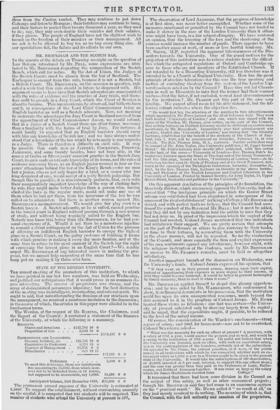MR. BROUGHAM AND THE SCOTCH BAR.
IN the reports of the debate on Thursday sennight on the question of Law Reform introduced by Mr. PEEL, some expressions are attri- buted to Mr. BROUGHAM respecting the composition of the Scotch Bench, which call for notice. By the Act of Union, the Judges of the Scotch Courts must be chosen from the bar of Scotland. The Exchequer is exempt from this rule, because it is not a Scotch, but a British Court. Mr. BROUGHAM, on the occasion in question, indi- cated a wish that this rule should in future be dispensed with. His argument seems to have been that Scotch advocates are unacquainted with the rules of evidence and the practice of Jury trials, and there- fore unfit to preside in a Jury Court, which the Court of Session is aboutto become. This inconvenience, he observed, had hitherto been unfelt, in consequence of the Lord Chief Commissioner being an English barrister as well as a Scotch advocate. Now, not meaning to underrate the advantages the Jury Court in Scotland received from the appointment of Chief Commissioner ADAM, we would submit, that in a Judge of a Scotch Court there are other things necessary than a familiarity with the forms of trial by Jury. For instance, it could hardly be expected that an English barrister should carry with him any knowledge of Scotch law ; and we have always under- stood that a knowledge of the law which he is to apply is one requisite in a Judge. There is therefore a difficulty on each side. It may be possible that such men as JEFFREY, COCKBURN, FORSYTH, JAMIESON, and some twenty besides, have not been' able, in the course of twelve or fifteen years' constant practice in the Scotch Jury Court, to gain such an intimate knowledge of its forms, and the rules of evidence necessary there, as an English junior counsel in four or five years' attendance behind the bar of the King's Bench ;—for no man but a junior, who as yet only hopes for a brief, or a senior who has Icing despaired of one, would accept of a petty Scotch judgeship. But though this be possible, it is also extremely probable, that, even with their comparatively imperfect knowledge of the way of eliciting facts by rule, they might make better Judges than a person who, having elicited the facts in the regular mode, could not make any use of them when he had got them, from his ignorance of the law he was called on to administer. But there is another reason against Mr. Buouofiam's no-improvement. We would give fair play even to a Scotch lawyer. A Scotch advocate, as he is called, cannot practise in the lowest court in England without passing through a new course of study, and without being regularly called to the English bare Nobody can know this better than Mr. BROUGHAM, for he had per- sonal experience of it. Would it not then be a monstrous injustice to commit a direct infringement on the Act of Union for the purpose of allowing an indifferent English barrister to occupy the highest place in a Scotch Court, on the paltry pretence of teaching it forms with which practice is making it every day more familiar, and at the same time to refuse to the most eminent of the Scotch bar the right of occupying the lowest place in an English Court ?—We readily acquit Mr. BROUGHAM of any interested views in making the pro- posal, but. we cannot help suspecting at the same time that he has beei put on making it by those who have.


















 Previous page
Previous page